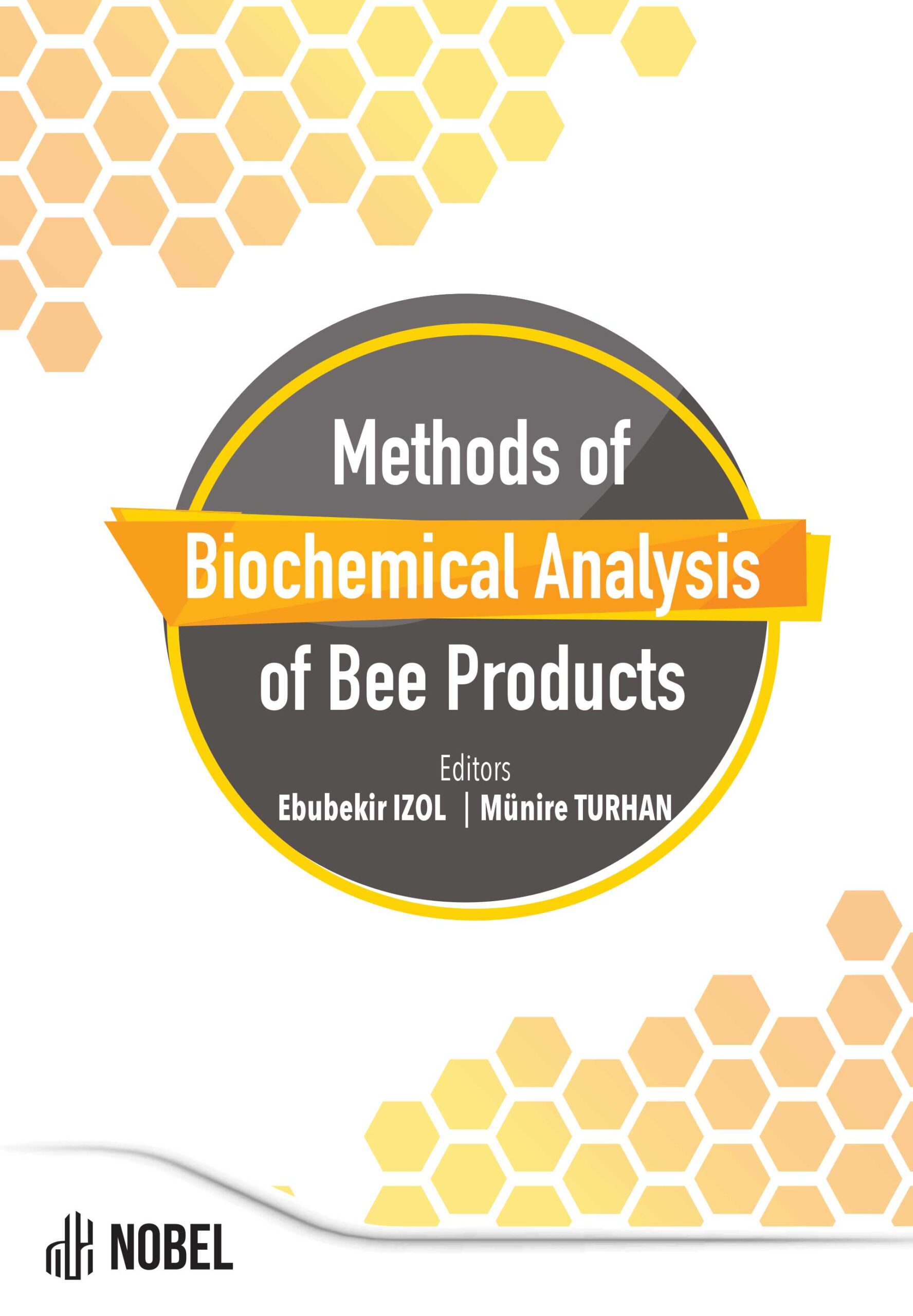Antioxidant Properties of Bee Products and Evaluation of Some in Vitro Analyzes
Veysel Tahiroglu (Author)
Release Date: 2024-06-07
Due to the different chemical contents of bee products such as honey, propolis, pollen, royal jelly, bee venom, beeswax and bee bread, it can be used as an antioxidant against damage that may be caused by oxidative stress. It covers highly reliable tests of the antioxidant capacities of bee products obtained from different geographical regions [...]
Media Type
Buy from
Price may vary by retailers
| Work Type | Book Chapter |
|---|---|
| Published in | Methods of Biochemical Analysis of Bee Products |
| First Page | 85 |
| Last Page | 107 |
| DOI | https://doi.org/10.69860/nobel.9786053359326.6 |
| Page Count | 23 |
| Copyright Holder | Nobel Tıp Kitabevleri |
| License | https://nobelpub.com/publish-with-us/copyright-and-licensing |
Veysel Tahiroglu (Author)
PhD, Asst. Prof. Dr., Şırnak University
https://orcid.org/0000-0003-3516-5561
3Veysel Tahiroğluwas graduated from the Faculty of VeterinaryMedicine Faculty, Kafkas University (Kars, Turkey). He completed hisdoctorate in Medical Biochemistry at the Faculty of Medicine of KafkasUniversity (Kars, Turkey). He now serves as a Faculty member at theNursing Department, Faculty of Health Sciences, Şırnak University (Şırnak, Turkey).
İzol, E.,&İzol, İ., 2022. Arı Ürünlerinin Spektroskopik Yöntemlerle Metal Konsantrasyonlarının Belirlenmesi ve Çevreye Etkileri. In Tarımsal Üretimde, Tarımsal Kirliliğin Ayak İzi, ed. Kökten K., İnci Ş., Iksad International Publishing House, 1, 209–230. ISBN: 978-625-8405-32-3.
Özdemir, C., Dağdemir, E., Özdemir, S. ve Sağdic, O., 2008. The Effects of Using Alternative Sweeteners to Sucrose on Ice Cream Quality, Journal of Food Quality, 31, 4, 415–428.
Molan, P.C.,1992. The Antimicrobial Activity of Honey, 1.The Nature of Antibacterial Activity, Bee World, 73, 5–28.
İzol, E. & Bengü, A.Ş., 2022. Apiterapi ve Klinik Uygulamalar. In Sağlık Bilimlerinde İnovatif Yöntemler, Teoriler ve Uygulamalar, ed. Bengü A.Ş., İzol E., Iksad International Publishing House,1, 21, ISBN:978-625-8213-40-9.
Bogdanov, S., Ruoff, K. ve Persano Oddo, L. 2004. Physico-chemical Methods for the Characterisation of Unifloral Honeys: A Review, Apidologie, 35, 4–17.
Ouchemoukh, S., Schweitzer, P., Bey, M.B., Djoudad-Kadji, H. ve Louaileche, H. 2010. HPLC Sugar Profiles of Algerian Honeys, Food Chemistry, 121, 561–568.
Gheldof, N., Wang, X.H. ve Engeseth, N.J., 2002. Identification and Quantification of Antioxidant Components of Honeys from Various Floral Sources, J. Agric. Food Chem., 50, 5870-5877.
Beratta, G., Granata, P., Ferrero, M., Orioli, M. ve Facino, R.M., 2005. Standardization of Antioxidant Properties of Honey by A Combination of Spectrophotometric/Fluorimetric Assays and Chemometrics, Anal. Chim. Acta, 533, 185-191.
Socha, R., Juszczak, L., Pietrzyk, S. ve Fortuna, T., 2009. Antioxidant Activity and Phenolic Composition of Herbhoneys, Food Chemistry, 113, 2, 568–574.
Isidorov, V., Bagan, R., Bakier, S., Swiecicka, I., 2015. Chemical composition andantimicrobial activity of Polish herbhoneys. Food Chemistry, 171, 84-88.
Abdel-Latif, M.M., 2015. Chemoprevention of gastrointestinal cancers by naturalhoney. World Journal Pharmacology 4(1), 160-167.
İzol, E. 2022. Arı Ürünlerinin Sağlıklı Beslenmedeki Önemi. In Sağlıklı Yaşam ve Beslenme, ed. Haspolat Y.K., Ertuğrul S., Orient Publications, 313-323. ISBN:978-605-2945-6-2.
İzol, E., 2021. Yenilikçi Arı Ürünleri ve Biyolojik Önemleri. In Tarım Uygulamalarında Yenilikçi Yaklaşımlar, ed. İnci H., Kökten K., Iksad Publications, 77–116.
Sonmez, E., Kekecoglu, M., Sahin, H., Bozdeveci, A., & Karaoglu, S. A., 2023. Comparing the biological properties and chemical profiling of chestnut bee pollen and bee bread collected from Anatolia. Brazilian Journal of Microbiology, 1-11.
Miłek, M., Mołoń, M., Kula-Maximenko, M., Sidor, E., Zaguła, G., & Dżugan, M., 2023. Chemical composition and bioactivity of laboratory-fermented bee pollen in comparison with natural bee bread. Biomolecules, 13(7), 1025.
Şahinler, N., 2000. Arı Ürünleri Yapısı ve İnsan Sağlığı Açısından Önemi, M.K.Ü. Ziraat Fakültesi Dergisi, 5, 139-148.
Saric, A., Balog, T., Sobocanec, S., Kusic, B., Sverko, V., Rusak, G., Likic, S., Bubalo, D., Pinto, B., Reali, D. ve Marotti, T., 2009. Antioxidant Effects Of flavonoid From Croatian Cystus İncanus L. Rich Bee Polen, Food and Chemical Toxicology, 47, 547–554.
Leja, M., Mareczek, A., Wyzgolik, G., Klepacz-Baniak, J. ve Czekonska, K., 2007. Antioxidative Properties of Bee Pollen in Selected Plant Species, Food Chemistry, 100, 237–240.
Bankova, V., Popova, M., Bodganov, S. ve Sabatini, A.G., 2002. Chemical Composition of European Propolis: Expected and Unexpected Results, Verlag der Zeitschrift fur Naturforschung, 57, 530–533.
Hegazi, A.G., 1998. Propolis An Overview, J. Bee In-formed, 5, 22-23 ve 6, 23-28.
| onix_3.0::thoth | Thoth ONIX 3.0 |
|---|---|
| onix_3.0::project_muse | Project MUSE ONIX 3.0 |
| onix_3.0::oapen | OAPEN ONIX 3.0 |
| onix_3.0::jstor | JSTOR ONIX 3.0 |
| onix_3.0::google_books | Google Books ONIX 3.0 |
| onix_3.0::overdrive | OverDrive ONIX 3.0 |
| onix_2.1::ebsco_host | EBSCO Host ONIX 2.1 |
| csv::thoth | Thoth CSV |
| json::thoth | Thoth JSON |
| kbart::oclc | OCLC KBART |
| bibtex::thoth | Thoth BibTeX |
| doideposit::crossref | CrossRef DOI deposit |
| onix_2.1::proquest_ebrary | ProQuest Ebrary ONIX 2.1 |
| marc21record::thoth | Thoth MARC 21 Record |
| marc21markup::thoth | Thoth MARC 21 Markup |
| marc21xml::thoth | Thoth MARC 21 XML |

